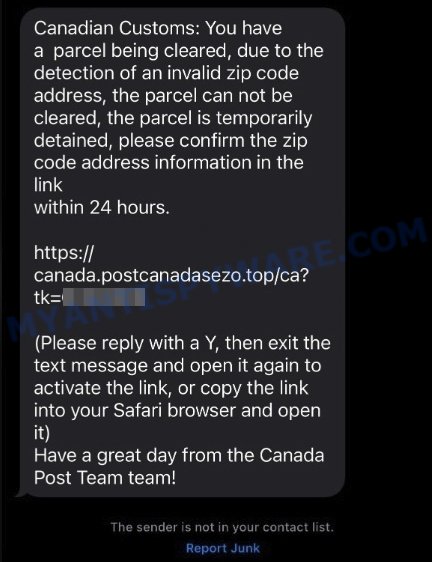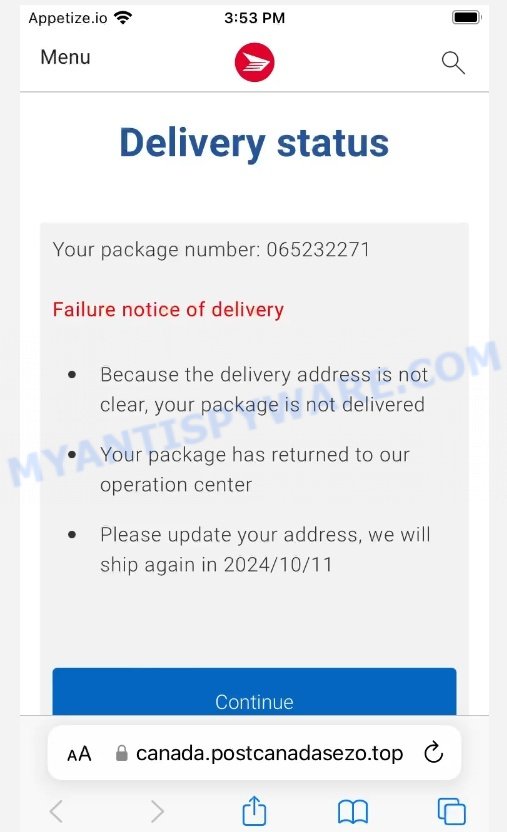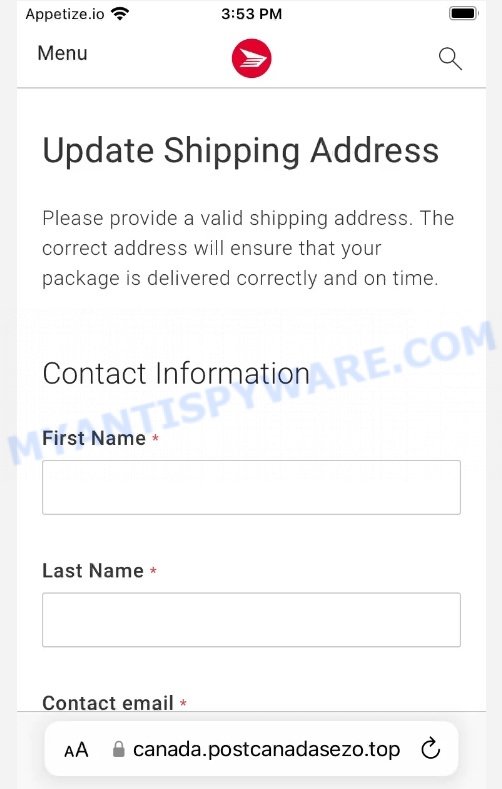Have you received a text message claiming to be from Canadian Customs about a parcel with an invalid zip code? Beware, this is a SCAM designed to mislead you into visiting harmful websites.

Here’s the scenario: The scam involves text messages falsely claiming to be from Canadian Customs. These messages alert you that a parcel could not be cleared due to an invalid zip code and prompt you to take immediate action. They include links like “hxxps://canada.postcanadasezo.top/ca?tk=ZrTtAsSK”, which are supposedly related to your parcel’s clearance. However, these links actually lead to fraudulent sites designed to steal your personal information or redirect you to other malicious websites.
The “Canadian Customs Invalid Zip Code” text message is a phishing scam. Despite appearing credible, it’s a deceitful tactic to entrap you. ❗ Remember, real notifications about parcel issues come from official and trustworthy channels, not through unsolicited text messages. Be cautious of clicking on links in text messages from unexpected sources and maintain your digital security measures. Awareness of these scams is key to protecting your online safety.
Table of Contents
🚨 Is the “Canadian Customs Invalid Zip Code” Text Message a Scam?
Yes, the text messages falsely claiming to be from Canadian Customs and concerning a parcel issue are a Scam! 🚫. If you’ve received a text message claiming that your parcel is detained due to an invalid zip code with a link to resolve the issue, exercise extreme caution. These messages are not legitimate notifications but are crafted to exploit your concerns about parcel delivery.
A typical “Canadian Customs Invalid Zip Code” text reads as follows:
Canadian Customs: You have a parcel being cleared, due to the detection of an invalid zip code address, the parcel can not be cleared, the parcel is temporarily detained, please confirm the zip code address information in the link within 24 hours.
https://canada.postcanadasezo.top/ca?tk=ZrTtAsSK
(Please reply with a Y, then exit the text message and open it again to activate the link, or copy the link into your Safari browser and open it)
Have a great day from the Canada Post Team team!
The fraudulent links in these texts direct users to various fake websites designed to mimic legitimate postal or customs services. 🚨 The objective? To deceive you into providing personal information or directing you to other malicious websites. These sites may steal personal details, login credentials, or even manipulate users into providing sensitive information. Remember: authentic notifications about parcel issues are typically communicated through official channels and not via unsolicited text messages. Always verify such information through reliable sources before engaging with such content. 🛡️
🚩 Red Flags to Watch Out For:
Be cautious and confirm the authenticity of such messages through official sources if you encounter these warning signs. 🔍🛡️
- 📧 Urgent and Concerning Messages: Messages starting with alarming alerts like “Canadian Customs: Your parcel” use urgency and concern as tactics in these scams.
- 🔗 Suspicious Links: The message includes a link to an external website, often masquerading as a resolution center for your parcel issues. Always inspect the link’s destination before clicking.
- ⏳ Immediate Calls to Action: The use of immediate calls to action, such as “Confirm within 24 hours”, aims to provoke quick concern and response.
- 🖼️ Misleading Appearances: Be wary of messages with links that falsely imply a connection to Canadian Customs or USPS, which are in reality setups for phishing websites.
- ✍️ Language and Tone: These messages may use worrying language to capture attention, often lacking the authenticity of genuine communication from official postal services.
- 👤 Faux Legitimacy: The scam often imitates credible alerts, like those supposedly from Canadian Customs, to instill a sense of legitimacy and trust.
- 🔄 Redirects to Phishing Sites: Legitimate parcel issues are usually handled on official websites of postal services, not through external links in text messages. Be wary of any message that redirects you away from familiar, trustworthy sources.
🕵️♂️ How the “Canadian Customs Invalid Zip Code” Scam Works
The “Canadian Customs Parcel” scam is a sophisticated form of social engineering that preys on users’ concerns about their parcel deliveries. Understanding its operation is crucial to protect yourself from falling victim to this deceptive tactic. 💡🔐
🚨 Urgency and Concern
The scam begins with a text message impersonating Canadian Customs, alerting the recipient that a parcel cannot be cleared due to an issue with the zip code. This tactic is designed to evoke a sense of urgency and concern, prompting users to click on a provided link without questioning its authenticity.

🔗 Deceptive Links
These scam texts include links that seem to offer a resolution to the parcel issue but are actually fraudulent. The links often lead to websites that mimic authentic postal or customs services, tricking users into believing they’re accessing legitimate sites. The primary aim? To redirect users to counterfeit websites where the scam unfolds. It’s crucial to understand that genuine postal services communicate through official channels, not through obscure links in text messages.
Deceptive Links Examples:
- https://canada.postcanadasezo[.]top
🎭 Phishing Websites and Malicious Redirects
Upon clicking, the link leads users to a site purporting to be about parcel clearing or customs updates. However, these are fake setups designed to convince the user of the message’s legitimacy and encourage them to interact further, usually by entering personal information or being redirected to other malicious websites.

📥 Phishing and Malware Risks
Interacting with these fraudulent sites poses various risks, including phishing attempts to capture personal and mailing address details, or redirection to websites that install malware. Users might be prompted to enter sensitive data or download files, jeopardizing their online security and privacy.
📋 Data Harvesting and Subscription Traps
The scam may involve more than stealing personal details. It can entice users through deceptive steps like fake address update forms to collect additional personal information for different forms of fraud or financial theft.

🔄 Illusion of Legitimacy
Throughout the interaction, the scam maintains its deception, providing users with false reassurances that they are accessing legitimate postal updates or customs notifications. This tactic keeps the user engaged and less likely to question the content’s authenticity, increasing their exposure to risks.
📢 Help Us Combat Scams: Report Your Experience!
If you’ve encountered the “Canadian Customs Invalid Zip Code” text message scam, we strongly encourage you to share your experience in the comments. Please include any details like the exact phrases used in the texts, the nature of the alerts, or the links to the scam websites. By sharing your story, you contribute to raising awareness about this scam, helping us track its prevalence, and potentially disrupt its deceptive operations. Your insights are crucial in our collective effort to combat online fraud. Together, we can keep our online community informed and safeguard against such phishing scams! 🛡️💬
Steps to Take if You Receive a Canadian Customs Invalid Zip Code Scam Text
Receiving a scam text claiming there is an issue with your parcel delivery can be distressing. However, there are effective actions you can take to protect yourself.

Action Guide Against Canadian Customs Invalid Zip Code Scam Texts:
Firstly, keep calm. The scam message wants to rush you into providing personal information or clicking on a malicious link. Recognize it for what it is: a common phishing attempt.
Do not click on any links or attachments. Doing so can lead to security risks such as malware infections or more deceptive phishing attempts.
Don’t reply. Responding to the scammer can give them more information about you and confirm that your phone number is active, which may lead to more scam texts.
If the scam text involves your parcel or personal details, verify the information independently. Contact Canadian Post or Canadian Customs directly using contact information from their official website, not the contact details or links provided in the message.
Next, update your security settings. Strengthen your privacy settings and passwords, and consider enabling two-factor authentication on your accounts to enhance security.
Check your device for safety. Run a scan with trusted security software to ensure your device hasn’t been compromised.
Report the scam text. Notify the Federal Trade Commission (FTC) at reportfraud.ftc.gov, and consider informing the U.S. Postal Inspection Service if the scam involves USPS impersonation.
Lastly, inform your network. Sharing information about this scam with friends, family, and colleagues can help prevent others from falling victim and raise overall awareness of such fraud tactics.
📌 How to Report the “Canadian Customs Invalid Zip Code” Text Scam?
If you receive the “Canadian Customs Invalid Zip Code” scam text message, it’s important to report it. Doing this helps keep you safe and also protects others from these deceptive practices. Here’s how you can report this scam:

🔍 Identify the Scam Text
Locate the text message that you suspect is part of the scam.
👉 Use Your Phone’s Reporting Feature
Most phones have an option to report a text message as spam or a scam. On many devices, this can be done by pressing and holding the message.
🚩 Select the Reporting Option
Choose the appropriate option to report the message. This could be “Report Spam” or “Report Message”.
📱 Contact Your Mobile Carrier
You can forward the suspicious text to 7726 (which spells “SPAM” on the keypad). This reports the message to your mobile carrier.
🔗 Report to Relevant Authorities
In some regions, you can report fraudulent messages to government bodies or consumer protection agencies. Check your local government website for more information on where to report.
🛡️ Additional Steps
If you’ve clicked on the link in the message, monitor your accounts for unusual activity and consider changing your passwords. You may also want to inform your financial institutions about the potential breach of your personal information.
✔️ Complete the Process
Follow any additional steps as directed by your phone, mobile carrier, or local authorities to finish reporting the scam.
Summary Table
| Name | “Canadian Customs Invalid Zip Code” Text Message Scam |
| Type | Phishing Scam, Identity Theft Risk |
| Scammers’ Websites | canada.postcanadasezo.top |
| Scam texts | Canadian Customs: You have a parcel being cleared, due to the detection of an invalid zip code address, the parcel can not be cleared, the parcel is temporarily detained, please confirm the zip code address information in the link within 24 hours. https://canada.postcanadasezo.top/ca?tk=ZrTtAsSK (Please reply with a Y, then exit the text message and open it again to activate the link, or copy the link into your Safari browser and open it) Have a great day from the Canada Post Team team! Delivery status Update Shipping Address |
Damage | Risk of personal data theft, potential financial fraud, exposure to malicious websites |
| Distribution | Text messages (SMS) impersonating Canadian Customs and USPS, often sent to random or targeted phone numbers with false claims about parcel delivery issues |
| Tactics | Alarming messages about undelivered parcels due to invalid zip code addresses, deceptive links leading to fake USPS websites asking for personal information |
| Prevention Tips | Avoid clicking on links in unsolicited texts, verify parcel status through official USPS channels, educate others about this scam, maintain strong cybersecurity practices, be wary of urgent and specific parcel alerts via SMS. |
| Reporting Info | Report suspicious texts to mobile carriers, notify USPS and U.S. Postal Inspection Service of fraudulent use of their name, stay up-to-date with the latest scam trends to recognize similar fraudulent activities |
😱 Steps to Take If You’ve Been Tricked by the “Canadian Customs Invalid Zip Code” Text Scam
If you think you might have clicked on a link from the “Canadian Customs Invalid Zip Code” text scam, it’s important to stay calm and act swiftly. This scam targets your financial security fears through urgent and misleading texts that lead to dangerous links. To address this, here’s a clear set of steps you can follow to minimize potential harm and protect your information.

🔐 Immediate Password Change
Immediately change the passwords for any accounts that you fear may be compromised. This includes your financial accounts, email, and any other sensitive accounts, especially if you have used similar passwords.
👀 Monitor Financial and Credit Reports
Closely monitor your bank accounts and credit reports for any unusual activities. Scammers might use your personal information to commit identity theft or unauthorized transactions.
📞 Contact Your Financial Institutions
Get in touch with your bank and credit card companies. Inform them about the scam and any actions you may have taken after interacting with the message. They can offer specific advice to secure your accounts.
🔒 Enable Two-Factor Authentication
Activate two-factor authentication for your sensitive accounts. This adds an extra layer of security, safeguarding your accounts even if scammers have obtained some of your credentials.
🚫🔗 Inform Your Contacts
Warn your friends, family, and network about the scam. Advise them to be cautious of similar messages and not to trust unsolicited texts or links, especially those claiming to be from financial institutions.
📝 Document the Scam
Record evidence of the scam, such as screenshots of the message and any interactions you had. This documentation can be useful if you need to report the incident or for future reference in case of any disputes or investigations.
👮♀️ Report to Cybersecurity Authorities
Consider reporting the incident to local cybersecurity or law enforcement authorities. While online scams are common, reporting them can contribute to broader efforts to combat such malicious activities.
📘 Stay Informed and Educated
Regularly update yourself on the latest online scams. Staying informed helps you recognize and avoid falling victim to similar tactics in the future.
🎯 Conclusion
The Canadian Customs Invalid Zip Code text message is a scam. The scammers behind this attempt use pressure tactics, sending messages that falsely claim there is an issue with your parcel’s delivery due to an invalid zip code. What is their goal? To deceive you into clicking on links that take you to phishing sites designed to steal your personal and financial information. Falling for this scam can result in the theft of your sensitive data, further scams targeting you, and potential financial losses.
It’s crucial to understand that legitimate notifications about parcel delivery issues generally come directly from the actual postal service or your local post office, not through unsolicited texts with dubious links. If you receive an unexpected message regarding parcel delivery or any postal issues, it’s essential to verify its authenticity by contacting the postal service directly or visiting their official website independently.
Avoid clicking on links in text messages, and inform your friends and family about these scams. Regularly updating your passwords and enabling additional security measures like two-factor authentication can significantly enhance your online security. 🛡️

















